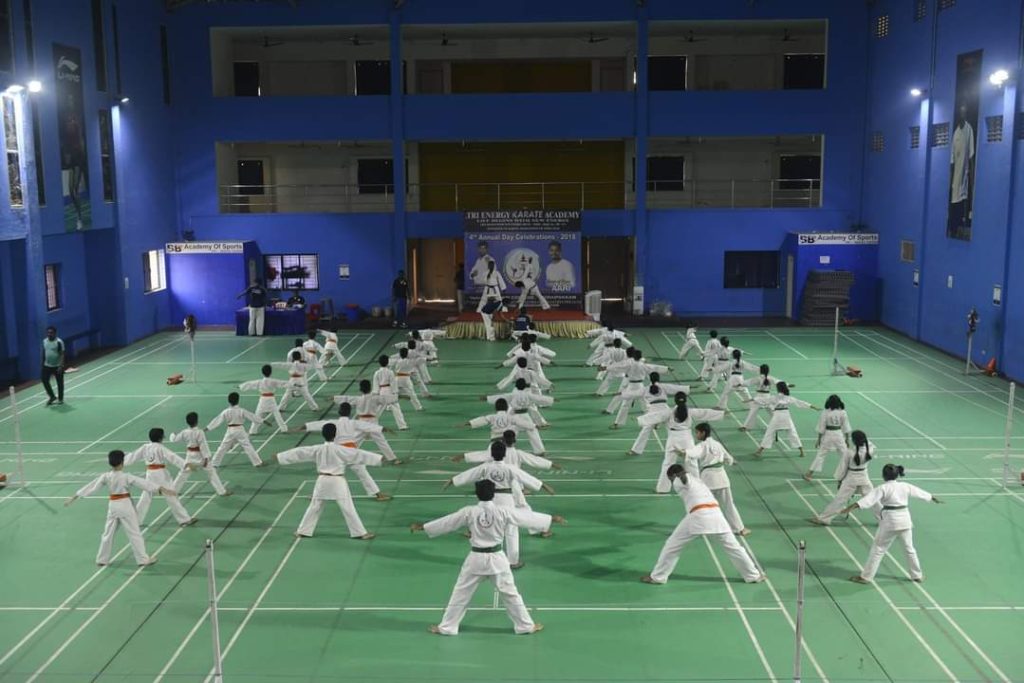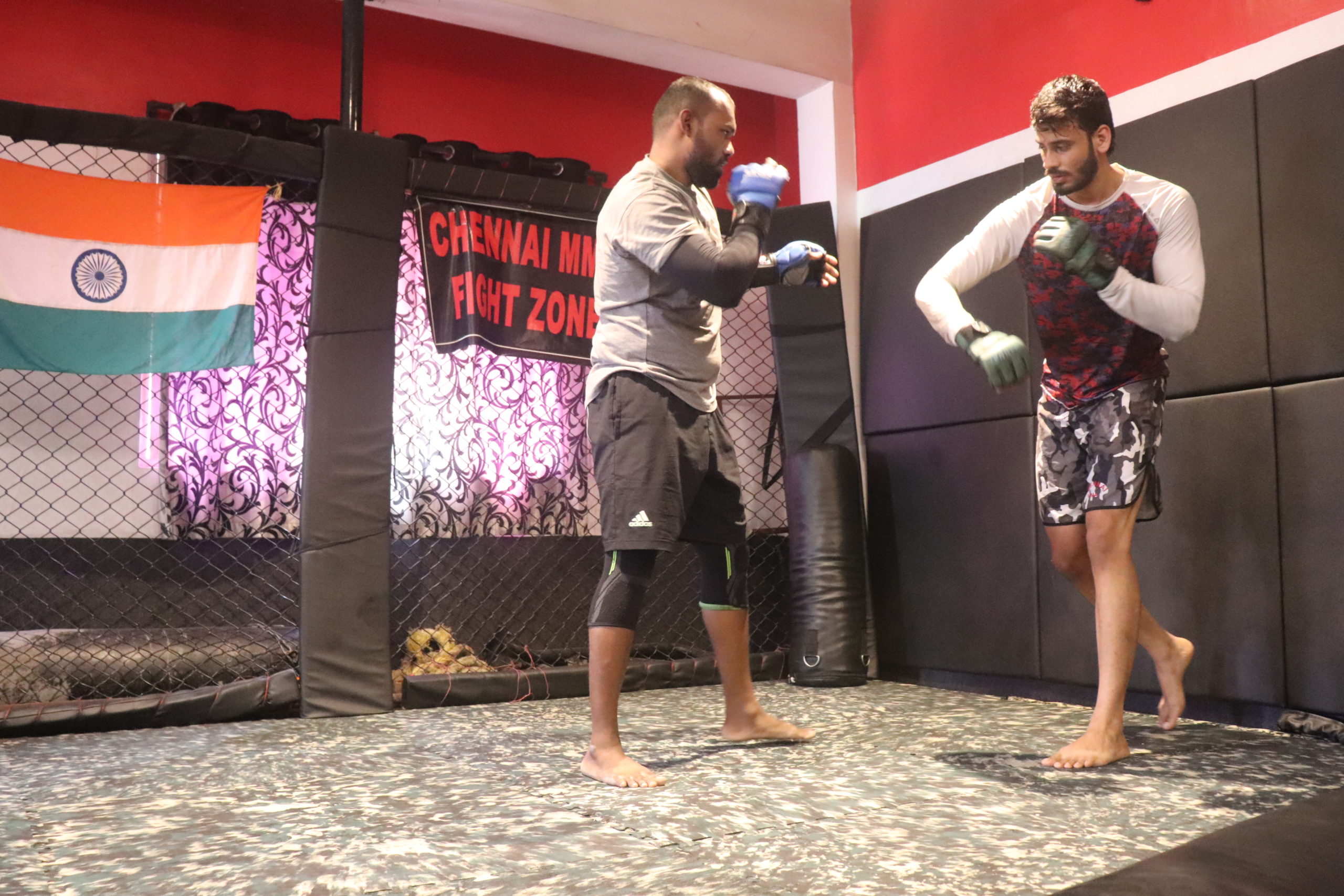It was evening and the hall was dimly lit. Posters of sparring Asian boxers adorned the walls. A punching bag, several pairs of boxing gloves and weight equipment lay at the further end of the room. The hall was empty save for two men who stood at the corner where the equipment was kept. Soft breeze flew in from the open windows and one could hear the faint noise of the vehicles on the main road outside.
We were at the Lefthook Mixed Martial Arts Academy, one of the numerous martial arts centres dotting Chennai. Like most other training academies in the city, Lefthook was shut for over four months when the lockdown began in March last year. It opened its doors again in mid-August 2020, the month in which the government of Tamil Nadu gave the green light for the reopening of these academies, as well as fitness centres and gyms.
Dinesh Kumar, one of the men at the hall, sat on the floor next to the punching bag. The 30-year old, wearing a black shirt and track pants, is the owner of Lefthook and its main trainer. He looked on as the other man, his assistant trainer, performed pull ups nearby.
Mr Kumar said that the academy faced several challenges owing to the pandemic. Upon reopening, it was difficult to reach out to many of his clients who had joined the centre before lockdown. He added that due to the academy’s location in Perungudi, a major commercial, residential and IT hub, most clients were software and IT professionals.
“Before the pandemic we had 10 to 15 enquiries a month on an average and six to seven people would visit the centres. We would have five people joining every month,” said Mr Kumar. “But since reopening (in August), it has come down to four or five enquiries a month and barely anyone new joining.”
He said that boxing and mixed martial arts are the most popular martial arts forms among enthusiasts, adding that he is confident of getting more participants in the coming months.

There were other changes that martial arts centres in Chennai have had to adapt to.
At the Chennai Mixed Martial Arts Academy, the number of training batches has been increased from two before March last year to three now in order to reduce crowd, said Adithya Sivaprasad, the centre’s Head of Operations. He added that timings for the batches have been reduced by 15 minutes.
“For the first three months after reopening, we did not do any ground training techniques such as Judo, Brazilian jiu-jitsu and grappling,” said Mr Sivaprasad. He added that practising with masks on was a major difficulty the participants faced in post-lockdown training.
While martial arts fighters and enthusiasts in the city are back to their training turfs and rings to sweat it out, the sport still suffers from a dearth of competitions and tournaments. The physical and close-combat nature of martial arts events has forced international and national associations to delay resuming contests.
“It will take about six to eight months, or maybe a year, for competitions to completely recover and get back to normal,” said an academy trainer from KK Nagar, who requested anonymity. He said that the audience for such contests would also likely be sparse as the public may not be willing to attend these events over COVID-19 fears.
Martial arts academies have also not been very receptive to online classes. Masters feel that the loss of personal touch in training and the inability to monitor and train their wards closely does not do justice to their job.
Describing online training as ‘not viable’, the trainer from KK Nagar said that the centre where he teaches provides only in-house training. “This is a kind of training where if we are not with you, you could get hurt. We do not want to take that chance,” he said.
R Balakumar, a karate master and founder of Tri Energy Karate Academy, expressed similar views.
“We are not interested in taking online classes, and we haven’t had it during the pandemic,” he said. Adding that it would have been unfair to charge fees for anything less than in-house training, he said that parents of his students appreciated the academy’s decision to not take online classes.
Among all martial arts forms, mixed martial arts has emerged as a favourite in Chennai, say trainers. For students and participants at the academies, the sport is a passion.
Mixed martial arts is gaining ground because it combines fighting techniques of different martial arts forms, said Dr Praveen Ganesh, an assistant professor at the Saveetha Medical College who trains at the Chennai MMA Academy. He also attributed the sport’s rising popularity in Chennai to growing awareness and self-consciousness about health in the months following the lockdown.
This outlook reflects an uptick in demand for martial arts products over the months since lockdown restrictions were lifted.
There has been a 20% rise in sales of martial arts equipment from our store compared to the monthly average in 2019 and before March 2020, said Akash, manager of Adyar Sports. The sports store, which reopened in October last year, sells boxing gloves, weights and punching bags apart from general sport products. Akash said that since October, the shop has seen a steady rise in footfall of walk-in customers wanting to buy martial arts gear.

